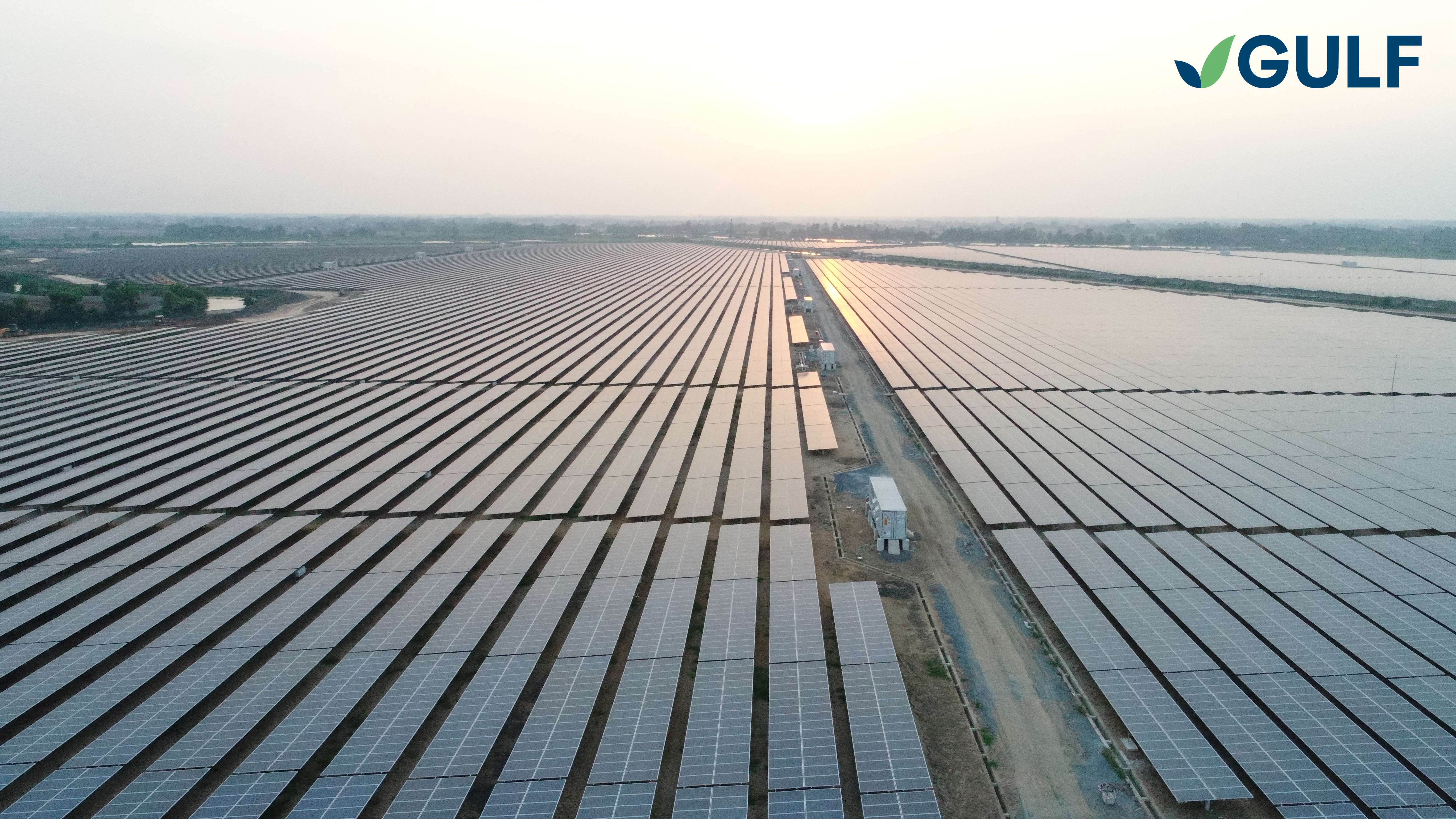Gulf Energy Development Plc. (GULF) reported the financial results for Q1/24 with a total revenue of THB
32,280 million, a 20% increase from THB 26,994 million in Q1/23 and a core profit of THB 4,152 million,
an increase of 13% YoY from THB 3,668 million in the same period of the previous year.
The growth was primarily driven by the improved performance of power generation business with the
commercial operation of units 1 and 2 (installed capacity of 1,325 MW) of IPD Group’s 2,650-MW Gulf
Pluak Daeng (GPD) IPP power project in March and October 2023. In addition, 1,540-MW Hin Kong Power
(HKP) IPP power project commenced commercial operation of unit 1 (installed capacity of 770 MW) in early
March. Therefore, GULF realized a full quarter contribution of GPD units 1 and 2 and started to
recognize a contribution of HKP unit 1 in this quarter. Furthermore, GULF recognized a share of core
profit from the GJP Group of THB 542 million, which represents a 27% YoY increase. This was mainly due
to the higher gross profit margins of 7 SPPs as the average natural gas cost decreased significantly
from 469 THB/MMBtu in Q1/23 to 351 THB/MMBtu in Q1/24, even though the GNS power plant, which is one of
the IPP under the GJP group, had a Major Inspection during Q1/24. However, core profit of the 12 SPPs
was on par with Q1/23, as the higher gross profit from lower average natural gas cost was offset by the
C-Inspection of power plants under the group. In addition, GULF also recognized a share of core profit
from the DIPWP project in Oman of THB 193 million in Q1/24, a 29% YoY increase, attributed to the higher
customer’s demand for both electricity and desalinated water.

For the renewable energy business, GULF recognized a share of core profit from the Borkum Riffgrund 2
(BKR2) offshore wind power project in Germany of THB 235 million in Q1/24, an increase of 54% YoY due to
higher average wind speed from 10.5 m/s in Q1/23 to 11.0 m/s in Q1/24. In addition, GULF1’s solar
rooftop projects have also gradually commenced commercial operation, reaching 113 MW at the end of
Q1/24. Nonetheless, the aforementioned positive factors were offset by a lower share of profit from wind
power projects under Gulf Gunkul Corporation. This decrease was due to a drop in the average wind speed
from 5.8 m/s in Q1/23 to 4.8 m/s in Q1/24, along with a lower project's average Ft in this quarter
compared to Q1/23.
For the gas business, GULF realized a share of core profit from PTT NGD of THB 211 million in Q1/24, a
recovery from a loss of THB 177 million in Q1/23, due to a significant decrease in the average natural
gas cost coupled with increase in fuel oil price from 65.5 USD/barrel in Q1/23 to 72.4 USD/barrel in
Q1/24, as the project’s revenue is linked to fuel oil price while cost is dependent on natural gas
price.
For the infrastructure business, GULF recorded revenue from a service concession arrangement for the
land reclamation work on the MTP3 industrial port development project, totaling THB 1,133 million in
Q1/24. This marks a 68% year-on-year increase, reflecting the progress of project development during the
quarter. The land reclamation work is scheduled for completion in 2024, of which the company plans to
further develop the LNG terminal project afterwards.
In Q1/24, GULF recognized a share of core profit from the investment in INTUCH of THB 1,575 million in
Q1/24, an increase of THB 329 million or 26% YoY from THB 1,247 million in Q1/23, attributed to the
strong performance of AIS from an increase in the revenue due to subscribers base expansion as AIS
focused on package restructuring to enhance more value to the customers, together with its efficient
cost management.
EBITDA for Q1/24 was THB 9,427 million, an increase of 16% compared to THB 8,143 million in Q1/23, while
the net profit attributable to the parent company, which takes into account the impact of the FX rate
and derivatives instruments, was THB 3,499 million, a 9% decrease from THB 3,850 million in Q1/23. The
decrease was due to the recognition of unrealized losses from exchange rates from the Thai Baht’s
depreciation against the US dollar from 34.39 THB/USD at the end of Q4/23 to 36.63 THB/USD at the end of
Q1/24. Nonetheless, the recording of such transaction is an accounting transaction that does not have an
impact on GULF’s cash flow and performance.
As of March 31, 2024, GULF reported total assets of THB 472,868 million, total liabilities of THB
324,563 million and shareholders’ equity of THB 148,306 million, with a net interest-bearing debt to
equity ratio of 1.70 times, slightly increased from 1.69 times as of December 31, 2023, due to loan
drawdowns from financial institutions used as working capital.

Ms. Yupapin Wangviwat, Deputy Chief Executive Officer and Chief Financial Officer, GULF, stated,
“GULF
maintains its 2024 total revenue growth at approximately 25-30%, driven by projects that are scheduled
for commercial operation this year. During Q1/24, the gas-fired GPD project unit 3 (662.5 MW) and the
gas-fired HKP project unit 1 (770 MW) commenced commercial operations as planned. For GPD project unit
4, with an installed capacity of 662.5 MW, is scheduled to commence commercial operation on October 31,
2024. Additionally, for the gas business, HKH, a joint venture in which the Company holds a 49% equity
stake, started to import 190,000 tonnes of LNG since the beginning of the year to support electricity
production for HKP project unit 1, with plan to import an additional of approximately 450,000 tonnes of
LNG during the remainder of this year.”
Ms. Yupapin added “GULF is currently prioritizing the expansion of its renewable energy portfolio,
including solar, wind, hydroelectric and waste-to-energy power projects both domestically and overseas,
as part of its strategic roadmap towards achieving net zero carbon emissions by 2050. Currently, GULF
has a committed installed capacity from renewable energy of approximately 8,500 MW in 5 countries and
plans to expand addition capacity of at least 3,000 MW through various renewable energy projects in
order to achieve the aforementioned target. By investing in renewable energy business, GULF not only
fosters environmental sustainability but also meets the growing demand for clean energy across various
industries."
“Furthermore, GULF is currently developing its data center business. Presently, there's a surge in
demand for data centers across public and private sectors, particularly among enterprises undergoing
digital transformation. Cloud-based data processing and storage, along with Artificial Intelligence (AI)
utilization, are becoming pivotal for local organizations and hyperscalers venturing into the Thai
market, addressing the escalating need for data storage and management. GULF's data center underscores
its commitment to sustainability, with a dedicated focus on leveraging clean energy sources, with plans
for 2 phases, each approximately 24-25 MW, totaling around 50 MW. Phase 1 of the data center is
currently under construction, slated for completion and operational around March 2025. By integrating
renewable energy into its digital infrastructure, GULF enhances its competitive edge in the rapidly
evolving digital realm.”




